Korelasi Positif antara Tumor Associated Macrophage dengan Stadium Klinis pada Adenokarsinoma Kolorektal
Abstract
Latar Belakang: Tingginya angka kejadian kanker kolorektal mendorong perkembangan pengetahuan mengenai kanker kolorektal, salah satunya mengenai tumor associated macrophage (TAM). TAM merupakan makrofag yang ditemukan dalam lingkungan mikro tumor dan dibagi menjadi 2 sub tipe M1 dan M2. Infiltrasi TAM akan mempengaruhi pertumbuhan ukuran serta akan berdampak pada stadium kanker yang lebih lanjut sehingga dicanangkan menjadi indikator prognosis pada kanker kolorektal. Tujuan: Mengetahui hubungan tumor associated macrophage dengan ukuran dan stadium kanker pada pasien adenokarsinoma kolorektal. Metode: Analitik observasional dengan pendekatan cross sectional menggunakan data sekunder. Sampel penelitian ini adalah 37 pasien adenokarsinoma kolorektal. Analisis statistik dengan uji Spearman. Hasil: Hasil dari analisis SPSS 25.0 didapatkan nilai sebesar 0,768 (p>0,05) untuk hubungan TAM dan klasifikasi “T” dan nilai sebesar 0,026 (p<0,05) untuk hubungan TAM dan stadium klinis. Kesimpulan: Tidak terdapat hubungan yang signifikan antara TAM dan klasifikasi “T” dan terdapat korelasi positif antara TAM dengan stadium klinis pada adenokarsinoma kolorektal.
Full Text:
PDFReferences
Sayuti M, Nouva. Kanker Kolorektal. Jurnal Averrous. 2019;5(2):76-88.
KEMENKES. Pedoman Nasional Pelayanan Kedokteran Tata Laksana Kanker Kolorektal. Jakarta. 2018
Recio-Boiles A, Cagir B. Colon Cancer. [Updated 2021 Jan 25]. In: StatPearls [Internet]. Treasure Island (FL): StatPearls Publishing; 2021 Jan-. Available from: https://www.ncbi.nlm.nih.gov/books/NBK470380/
Rawla P, Sunkara T, Barsouk A. Epidemiology of colorectal cancer: incidence, mortality, survival, and risk factors. Prz Gastroenterol. 2019;14(2):89-103.
Yahaya MAF, Lila MAM, Ismail S, Zainol M, Afizan NARNM. Tumour-Associated Macrophages (TAMs) in Colon Cancer and How to Reeducate Them. J Immunol Res. 2019;2019:2368249.
Zhong X, Chen B, Yang Z. The Role of Tumor-Associated Macrophages in Colorectal Carcinoma Progression. Cell Physiol Biochem. 2018;45:356-364.
Weixing D, Yaqi L, Xianke M, Sanjun C, Qingguo L, Guoxiang C. Does tumor size have its prognostic role in colorectal cancer? Re-evaluating its value in colorectal adenocarcinoma with different macroscopic growth pattern, International Journal of Surgery, 2017;45:105-112,
Rey I. Hubungan Ekspresi CD133, LGR5, CD166 Sel Punca Kanker Kolorektal dan CD163 Tumor Associated Macrophage Dengan Perbedaan Lokasi Kanker Kolorektal.[Disertasi]. Sumatera Utara : Universitas Sumatera Utara. 2020
Handayani MK, Maulani H, Apriyani N. Hubungan Kepadatan Tumor Associated Macrophages CD-68 dan Karakteristik Klinikopatologi pada Karsinoma Payudara Invasif. Maj Patol Indones 2020;29(2):82-88
Putri NV, Neti, Rasyud RSP, Murti K. Hubungan Kepadatan Tumor-Associated-Macrophages dan Tumor-Associated-Neutrophils dengan Karakteristik Klinikohistopatologi pada Pasien Limfona Hodgkin. Maj Patol Indones. 2021;30(2):264-271.
Khosama Y. Faktor Risiko Kanker Kolorektal. CDK-234. 2015;42(11)
Wong MCS, Ding H, Wang J, Chan PSF, Huang J. Prevalence and Risk Factors of Colorectal Cancer in Asia. Intest Res. 2019;17(3):317-329.
Li J, Guo BC, Sun LR, Wang JW, Fu XH, Zhang SZ, et al. TNM staging of colorectal cancer should be reconsidered by T stage weighting. World J Gastroenterol. 2014;20(17):5104-5112.
National Health Commission Of The People's Republic Of China. National guidelines for diagnosis and treatment of colorectal cancer 2020 in China (English version). Chin J Cancer Res. 2020;32(4):415-445.
National Cancer Institute. Surveillance, Epidemiology, and End Results Program : Colorectal cancer. NCI. Diakses pada : https://seer.cancer.gov/statfacts/html/colorect.html
Erreni M, Mantovani A, Allavena P. Tumor-associated Macrophages (TAM) and Inflammation in Colorectal Cancer. Cancer Microenviron. 2011;4(2):141-154.
Shibutani, M., Maeda, K., Nagahara, H. et al. The peripheral monocyte count is associated with the density of tumor-associated macrophages in the tumor microenvironment of colorectal cancer: a retrospective study. BMC Cancer. 2017;17(404).
Nielsen S.R., Schmid M.C. Macrophages as Key Drivers of Cancer Progression and Metastasis. Mediat. Inflamm. 2017;2017:9624760.
Pansa MF, Lamberti MJ, Cogno IS, Correa SG, Rumie Vittar NB, Rivarola VA: Contribution of resident and recruited macrophages to the photodynamic intervention of colorectal tumor microenvironment. Tumour Biol 2016;37:541-552.
Cardoso AP, Pinto ML, Pinto AT, Oliveira MI, Pinto MT, Goncalves R, Relvas JB, Figueiredo C, Seruca R, Mantovani A, Mareel M, Barbosa MA, Oliveira MJ: Macrophages stimulate gastric and colorectal cancer invasion through EGFR Y(1086), c-Src, Erk1/2 and Akt phosphorylation and smallGTPase activity. Oncogene 2014;33:2123-2133.
Tang X, Mo C, Wang Y, Wei D, Xiao H. Anti-tumour strategies aiming to target tumour-associated macrophages. Immunology. 2013;138(2):93–104, 2013.
Mellman I, Coukos G, Dranoff G. Cancer immunotherapy comes of age. Nature. 2011;480(7378):480–489.
Badawi MA, Abouelfadl DM, El-Sharkawy SL, El-Aal WE, Abbas NF. Tumor-Associated Macrophage (TAM) and Angiogenesis in Human Colon Carcinoma. Open Access Maced J Med Sci. 2015;3(2):209-214.
Mantovani A., Locati M. Tumor-associated macrophages as a paradigm of macrophage plasticity, diversity and polarization. Arteriosclerosis, Thrombosis, and Vascular Biology. 2013;33(7):1478–1483
Biswas S. K., Mantovani A. Macrophage plasticity and interaction with lymphocyte subsets: cancer as a paradigm. Nature Immunology. 2010;11(10):889–896.
Sica A., Mantovani A. Macrophage plasticity and polarization: in vivo veritas. The Journal of Clinical Investigation. 2012;122(3):787–795.
Gordon S., Martinez F. O. Alternative activation of macrophages: mechanism and functions. Immunity. 2010;32(5):593–604.
Williams CB, Yeh ES, Soloff AC. Tumor-associated macrophages: unwitting accomplices in breast cancer malignancy. NPJ Breast Cancer. 2016; 2:15025.
Sanmamed MF, Perez-Gracia JL, Schalper KA, Fusco JP, Gonzalez A, Rodriguez-Ruiz ME, et al. Changes in serum interleukin-8 (IL-8) levels reflect and predict response to anti-PD-1 treatment in melanoma and non-small-cell lung cancer patients. Ann Oncol. 2017;28:1988–95.
Liu CY, Xu JY, Shi XY, Huang W, Ruan TY, Xie P, et al. M2-polarized tumor-associated macrophages promoted epithelial-mesenchymal transition in pancreatic cancer cells, partially through TLR4/IL-10 signaling pathway. Lab Invest. 2013;93:844–54
Ouyang W, O'Garra A. IL-10 family cytokines IL-10 and IL-22: from basic science to clinical translation. Immunity. 2019;50:871–91.
Yang L, Zhang Y. Tumor-associated macrophages: from basic research to clinical application. J Hematol Oncol. 2017;10(1):58.





















